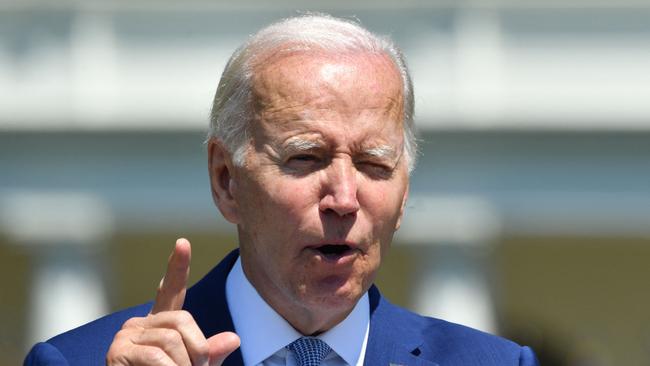Joe Biden’s age in the spotlight for 2024 election
Debate is mounting over 79-year-old Joe Biden’s apparent desire to run again in 2024.

Is Joe Biden too old to be president?
It’s a question that has provided ample fodder for Republicans and right-wing outlets, while Democrats and most of the American media have been reluctant to broach it.
But as the oldest person ever elected to the top US office prepares for a gruelling Middle East tour this week, debate is mounting over his apparent desire to run again in 2024.
The issue puts Democrats in a difficult position as there is no clear alternative to Biden, who turns 80 on November 20.
“He’s fit to be president right now. But he’s too old for the next election,” The Atlantic concluded in a recent article.
Disenchantment with Biden runs deep inside his own camp, with a New York Times poll released on Monday showing that 64 per cent of Democratic voters would prefer another candidate in 2024. His age was cited as the main reason for those who want a change.
The President would be 82 at the start of a second term, and 86 at its conclusion. By comparison, Ronald Reagan was 77 when he left office in 1989.
Like his predecessors, Biden has exhausting responsibilities, from the war in Ukraine and runaway inflation to gun violence plaguing the country and a fiercely conservative Supreme Court.
There are certainly many Americans who envy his health, with a check-up last November finding that he is a “vigorous” man suffering from mild problems with acid reflux and arthritis.
But his appearance betrays the heavy toll taken by the office: his white hair is increasingly thin, his gait cautious. He sometimes loses his train of thought or stumbles while reading from a teleprompter, and the stutter he overcame as a child periodically resurfaces.
The White House has several times had to walk back inopportune remarks he has made on sensitive diplomatic issues.
Biden gives fewer news conferences and interviews than his predecessors, preferring to publish op-eds in newspapers, the content of which can be carefully controlled.
On the weekends, he often disappears to one of his two homes in Delaware for two or three days. White House correspondents only see him once, at a distance, when he goes to mass.
And when G7 leaders posed for a photo at last month’s summit, it was impossible to ignore the age gap between Biden and Canadian Prime Minister Justin Trudeau, 50, or French President Emmanuel Macron, 44.
But his aides defend him vigorously, with senior adviser Mike Donilon telling The New York Times that the President wants “to spend four hours planning for how we hit the ground running on domestic policy, when all much younger staff want to do is sleep” on the plane.
The President is far from the exception in American politics, where many key players are over 70, including his predecessor Donald Trump, who is 76.
Trump, a potential 2024 Republican candidate, knows the age card plays well, and is keen to use it.
Beyond health issues, there is also the political question of how a president born during World War II can remain in touch with younger Americans.
How does he respond, for instance, to young demonstrators who protested in front of the White House against the Supreme Court removing the federal right to an abortion?
Biden did not have a clear answer, saying: “Keep protesting. Keep making your point. It’s critically important.”
A Morning Consult poll conducted in April and May found only 43 per cent of Democrats between the ages of 18 and 34 believe Biden is keeping his promises.
But who could replace him? Commentators are sceptical about the chances of 57-year-old Vice-President Kamala Harris, who would be a natural candidate if Biden withdraws. A member of the party’s younger guard, such as California Governor Gavin Newsom, 54, or 40-year-old Transportation Secretary Pete Buttigieg, would be another option.
But a frontrunner has yet to emerge from the Democratic camp.
AFP



To join the conversation, please log in. Don't have an account? Register
Join the conversation, you are commenting as Logout